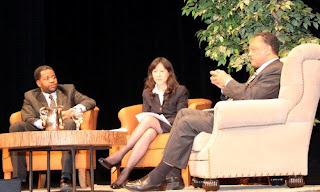When I came out of the closet in college in the late 1980s, I
thought I was a unicorn. That is, I believed that I was a mythical
creature; surely I was the only gay Asian American person in the universe.
All of the gay spaces that I belonged to were white, and all of the Asian
American spaces that I belonged to were straight. There couldn’t possibly
be others like me!
Never in my wildest imagination did I think that, some
twenty-five years later, I would be attending a national conference of some 350
lesbian, gay, bisexual, and transgender (LGBT or queer) Asian American
activists and allies in Washington, D.C.
Nor would I have ever imagined that I would be invited to a White
House briefing about issues of interest to the queer Asian American community.
The conference, “Presence, Power, Progress,” was organized by the National Queer Asian Pacific Islander Alliance (NQAPIA), an umbrella organization of LGBT East Asian,
Pacific Islander, South Asian, and Southeast Asian organizations in the United
States. This was only the second national NQAPIA conference, the first
one being in Seattle in 2009.
On Thursday, July 19th, the day before the conference officially
began, I attended an interfaith convening of LGBT Asian Americans who were
interested in faith-based issues. It was an amazing experience to sit
around a table with queer Hindu, Muslim, and Christian Asian Americans and talk
about how we could support those in our communities who were struggling with
issues of race, sexuality, and spirituality.
Later that afternoon, I was privileged to attend a briefing at
the White House by Obama administration officials about issues that were of
interest to the LGBT Asian American community. The three-hour briefing
touched upon a number of important issues, including immigration, bullying,
international human rights, and HIV/AIDS. We even heard from Chris Lu,
the President’s Cabinet Secretary and the highest-ranking Asian American in the
administration.
The conference itself lasted three days – from Friday, July 20th,
through Sunday, July 22nd – and offered numerous panels and workshops to the
participants. One highlight for me was speaking at a workshop for LGBT
Asian American Christians who were wrestling with heterosexism and homophobia
in their churches. The workshop was led by Jess Delegencia, the Asian
Pacific Islander Roundtable Coordinator at the Center for Lesbian and Gay Studies in Religion and Ministry in Berkeley, California.
We also had a lot of fun. There was a queer Asian American
performing arts festival on Friday night, and there was also a festive banquet
on Saturday night emceed by Tamlyn Tomita of The Karate Kid II fame (and
who played Mike Chang’s mom on Glee). On Sunday morning, I
attended Eucharist at St. Paul’s Episcopal Church on K Street with Weiben Wang,
a friend of mine from New York City.
Perhaps the most exciting part of the conference for me, however,
was the fact that my mom, Deanna Cheng, also attended the conference and
visited the White House. My mom had been invited by the conference
organizers to participate in a gathering of Asian American parents of LGBT
children and to film a public service announcement for the Asian Pride Project.
Thinking back to when I first came out to my mom, I can only attribute
how far we’ve come to God’s amazing grace.
It was an incredible blessing to attend the NQAPIA conference and
to visit the White House as an openly gay Asian American man. I am
grateful to the co-directors of NQAPIA, Ben de Guzman and Glenn Magpantay, for
making the conference happen. Most of all, however, I am grateful for my
fellow LGBT Asian American activists around the country for ensuring that no
queer Asian American person ever has to feel like a mythical creature for being
honest about who they are – racially, sexually, or spiritually.
Patrick S. Cheng is the Associate Professor of Historical and
Systematic Theology at the Episcopal Divinity School in Cambridge,
Massachusetts. For more information about him, see his website at http://www.patrickcheng.net.









